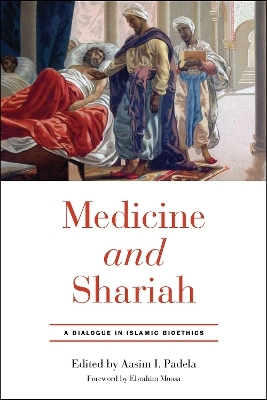
Medicine and Shariah
University of Notre Dame Press (Verlag)
978-0-268-10837-3 (ISBN)
Although much ink has been spilled in generating Islamic responses to bioethical questions and in analyzing fatwas, Islamic bioethics still remains an emerging field. How are Islamic bioethical norms to be generated? Are Islamic bioethical writings to be considered as part of the broader academic discourse in bioethics? What even is the scope of Islamic bioethics? Taking up these and related questions, the essays in Medicine and Shariah provide the groundwork for a more robust field. The volume begins by furnishing concepts and terms needed to map out the discourse. It concludes by offering a multidisciplinary model for ethical deliberation that accounts for the various disciplines needed to derive Islamic moral norms and to understand biomedical contexts. In between these bookends, contributors apply various analytic, empirical, and normative lenses to examine the interaction between biomedical knowledge (represented by physicians) and Islamic law (represented by jurists) in Islamic bioethical deliberation.
By providing a multidisciplinary model for generating Islamic bioethics rulings, Medicine and Shariah provides the critical foundations for an Islamic bioethics that better attends to specific biomedical contexts and also accurately reflects the moral vision of Islam. The volume will be essential reading for bioethicists and scholars of Islam; for those interested in the dialectics of tradition, modernity, science, and religion; and more broadly for scholarly and professional communities that work at the intersection of the Islamic tradition and contemporary healthcare.
Contributors: Ebrahim Moosa, Aasim I. Padela, Vardit Rispler-Chaim, Abul Fadl Mohsin Ebrahim, Muhammed Volkan Yildiran Stodolsky, Mohammed Amin Kholwadia, Hooman Keshavarzi, and Bilal Ali.
Aasim I. Padela is professor of emergency medicine, bioethics, and humanities at the Medical College of Wisconsin. He is also director of the Initiative on Islam and Medicine and co-editor of Islam and Biomedicine. Ebrahim Moosa is the Mirza Family Professor of Islamic Thought and Muslim Societies at the University of Notre Dame.
Preface
An Introduction to Islamic Bioethics: Its Producers and Consumers
1. The Relationship between Medicine and Religion: Insights from the Fatwa Literature
2. The Islamic Juridical Principle of Dire Necessity (al-ḍarūra) and its Application to the Field of Biomedical Interventions
3. A Jurisprudential (Uṣūlī) Framework for Cooperation between Muslim Jurists and Physicians and Its Application to the Determination of Death
4. Considering Being and Knowing in an Age of Techno-Science
5. Exploring the Role of Mental Status and Expert Testimony in the Islamic Judicial Process
6. Muslim Perspectives on the American Healthcare System: The Discursive Framing of “Islamic” Bioethical Discourse
7. Muslim Doctors and Islamic Bioethics: Insights from a National Survey of American Muslim Physicians
8. Jurists, Physicians, and Others in Dialogue: A Multidisciplinary Vision for Islamic Bioethical Deliberation
| Erscheinungsdatum | 07.06.2021 |
|---|---|
| Vorwort | Ebrahim Moosa |
| Verlagsort | Notre Dame IN |
| Sprache | englisch |
| Maße | 152 x 229 mm |
| Themenwelt | Geisteswissenschaften ► Philosophie ► Ethik |
| Geisteswissenschaften ► Religion / Theologie ► Islam | |
| Medizin / Pharmazie ► Medizinische Fachgebiete ► Medizinethik | |
| Studium ► Querschnittsbereiche ► Geschichte / Ethik der Medizin | |
| Recht / Steuern ► EU / Internationales Recht | |
| Recht / Steuern ► Privatrecht / Bürgerliches Recht ► Medizinrecht | |
| ISBN-10 | 0-268-10837-4 / 0268108374 |
| ISBN-13 | 978-0-268-10837-3 / 9780268108373 |
| Zustand | Neuware |
| Informationen gemäß Produktsicherheitsverordnung (GPSR) | |
| Haben Sie eine Frage zum Produkt? |
aus dem Bereich


